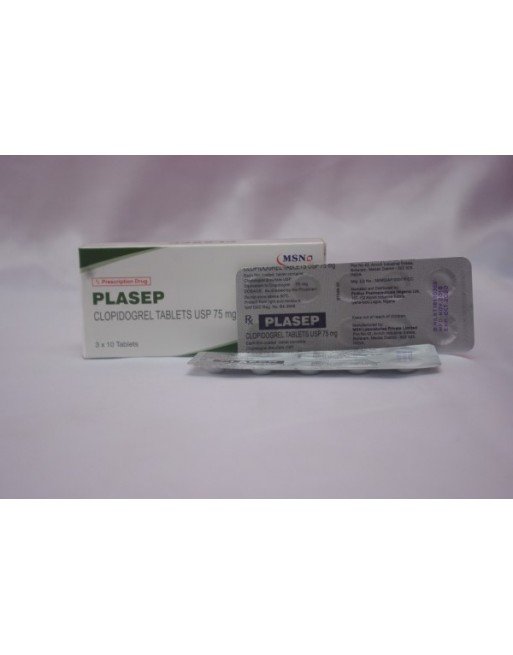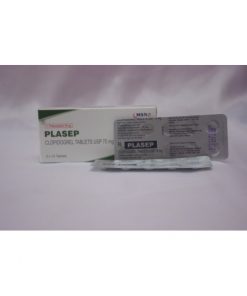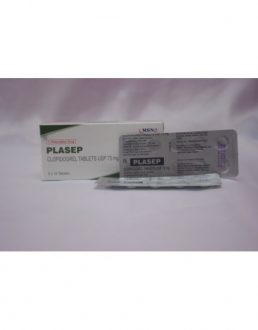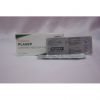Please Note!
ALL ORDERS WE RECEIVE ON OR BEFORE 6:00PM (LOCAL TIME) WILL BE PROCESSED AND DISPATCHED TO YOU THE SAME DAY.
Plasep 75mg (Clopidogrel)
₦650.00
Out of stock
Description
Clopidogrel Tablets belong to a group of medicines called antiplatelet medicinal products. Platelets are very small structures in the blood, which clump together during blood clotting. By preventing this clumping, antiplatelet medicinal products reduce the chances of blood clots forming (a process called thrombosis).
Clopidogrel Tablets are taken to prevent blood clots (thrombi) forming in hardened blood vessels (arteries), a process known as atherothrombosis, which can lead to atherothrombotic events (such as stroke, heart attack or death).
You have been prescribed Clopidogrel Tablets to help prevent blood clots and reduce the risk of these severe events because:
- You have a condition of hardening of the arteries (also known as atherosclerosis), and
- You have previously experienced a heart attack, stroke or have a condition known as peripheral arterial disease.
2. BEFORE YOU TAKE CLOPIDOGREL TABLETS
Do not take Clopidogrel Tablets:
- If you are allergic (hypersensitive) to clopidogrel or any of the other ingredients in Clopidogrel Tablets
- If you have a medical condition that is currently causing bleeding such as a stomach ulcer or bleeding within the brain
- If you suffer from severe liver disease
If you think any of these apply to you, or if you are in any doubt at all, consult your doctor before taking Clopidogrel Tablets.
Take special care with Clopidogrel Tablets:
If any of the situations mentioned below apply to you, you should tell your doctor before taking Clopidogrel Tablets:
- if you have a risk of bleeding such as:
- a medical condition that puts you at risk of internal bleeding (such as a stomach ulcer)
- a blood disorder that makes you prone to internal bleeding (bleeding inside any tissues, organs or joints of your body)
- a recent serious injury
- a recent surgery (including dental)
- a planned surgery (including dental) in the next seven days
- if you have had a clot in an artery of your brain (ischaemic stroke) which occurred within the last seven days
- if you have kidney or liver disease.
While you are taking Clopidogrel Tablets:
- You should tell your doctor if a surgery (including dental) is planned
- You should also tell your doctor immediately if you develop a medical condition (also known as Thrombotic Thrombocytopenic Purpura or TTP) that includes fever and bruising under the skin that may appear as red pinpoint dots, with or without unexplained extreme tiredness, confusion, yellowing of the skin or eyes (jaundice) (see section 4 ‘Possible Side Effects’)
- If you cut or injure yourself, it may take longer than usual for bleeding to stop. This is linked to the way your medicine works as it prevents the ability of blood clots to form. For minor cuts and injuries e.g., cutting yourself shaving, this is usually of no concern. However, if you are concerned by your bleeding, you should contact your doctor straightaway (see section 4 ‘Possible Side Effects’)
- Your doctor may order blood tests
Clopidogrel Tablets are not intended for use in children or adolescents.
Taking other medicines
Please tell your doctor or pharmacist if you are taking or have recently taken any other medicines, including medicines obtained without a prescription. Some other medicines may influence the use of Clopidogrel Tablets or vice versa.








Reviews
There are no reviews yet.